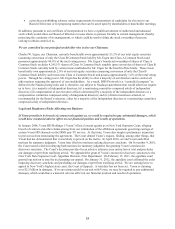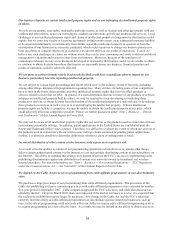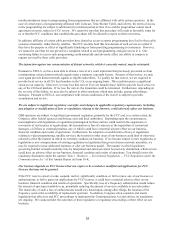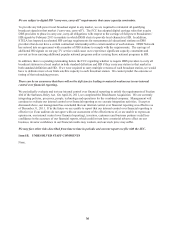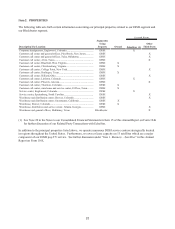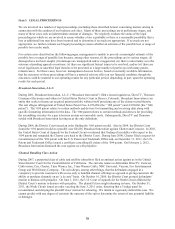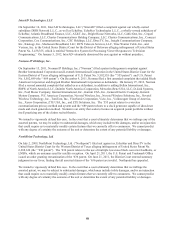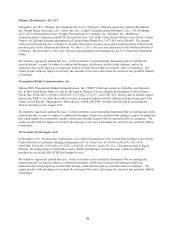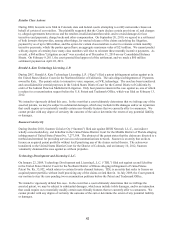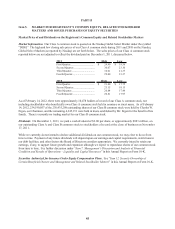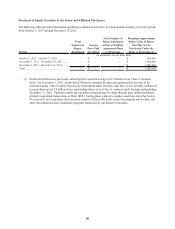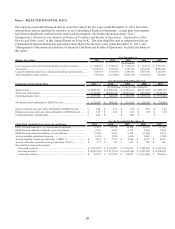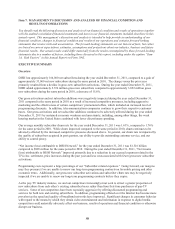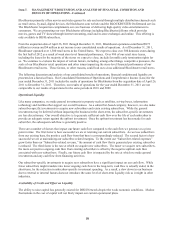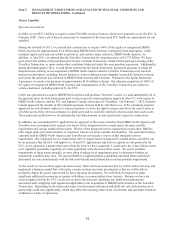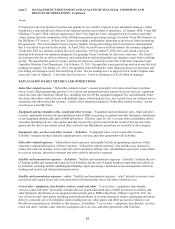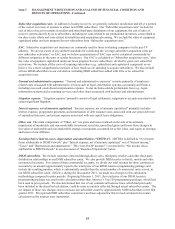Dish Network 2011 Annual Report Download - page 53
Download and view the complete annual report
Please find page 53 of the 2011 Dish Network annual report below. You can navigate through the pages in the report by either clicking on the pages listed below, or by using the keyword search tool below to find specific information within the annual report.43
43
TiVo Inc.
In connection with our litigation with TiVo Inc. (“TiVo”), which is described in our periodic reports filed with the
SEC, including in our annual report on Form 10-K for the year ended December 31, 2010 under the caption “Item 3.
Legal Proceedings – TiVo Inc.,” on April 20, 2011, the U.S. Court of Appeals for the Federal Circuit vacated the
District Court’s contempt ruling on infringement, articulated a new standard for determining “colorable difference”
and remanded that issue back to the District Court for determination. The Federal Circuit also vacated the District
Court’s amended injunction requiring that we inform the court of any further attempts to design around TiVo’s
United States Patent No. 6,233,389 (the ‘389 patent) and seek approval from the court before any such design-
around is implemented. The Federal Circuit also vacated the infringement damages for the period after we deployed
our original alternative technology (although it did not foreclose that damages may be reinstated if upon remand a
new court or jury decision found that the original alternative technology infringed TiVo’s ‘389 patent). The Federal
Circuit affirmed the District Court’s contempt ruling on disablement, holding that the original 2006 injunction
required that we disable DVR functionality in all but approximately 192,000 digital set-top boxes deployed with
customers (the “Disablement Provision”) and affirmed the $90 million in contempt sanctions awarded against us for
violating the Disablement Provision.
On April 29, 2011, we and EchoStar entered into a settlement agreement with TiVo. The settlement resolves all
pending litigation between us and EchoStar, on the one hand, and TiVo, on the other hand, including litigation
relating to alleged patent infringement involving certain DISH digital video recorders, or DVRs, which litigation is
described in our periodic reports filed with the Securities and Exchange Commission including in our annual report
on Form 10-K for the year ended December 31, 2010 under the caption “Item 3. Legal Proceedings – TiVo Inc.”
Under the settlement agreement, all pending litigation has been dismissed with prejudice and all injunctions that
permanently restrain, enjoin or compel any action by us or EchoStar have been dissolved. We and EchoStar are
jointly responsible for making payments to TiVo in the aggregate amount of $500 million, including an initial
payment of $300 million and the remaining $200 million in six equal annual installments between 2012 and 2017.
Pursuant to the terms and conditions of the agreements entered into in connection with the Spin-off of EchoStar
from us, we made the initial payment to TiVo in May 2011, except for a contribution from EchoStar totaling
approximately $10 million, representing an allocation of liability relating to EchoStar’s sales of DVR-enabled
receivers to an international customer. Future payments will be allocated between us and EchoStar based on
historical sales of certain licensed products, with us being responsible for 95% of each annual payment.
As previously disclosed, our total litigation accrual for TiVo was $517 million as of December 31, 2010. As a result
of the settlement agreement, we reversed $335 million of this accrual and made a payment of approximately $290
million for our portion of the initial payment to TiVo. Of this amount, approximately $182 million relates to prior
periods and the remaining $108 million represents a prepayment. Our $108 million prepayment and our $190
million share of the remaining payments, a total of $298 million, will be expensed ratably as a subscriber-related
expense from April 1, 2011 through July 31, 2018, the expiration date of the ‘389 patent. In connection with our
TiVo settlement, TiVo agreed to advertise and market certain of our products and services. As a result, $6 million
was recognized as a reduction of litigation expense and we recorded a pre-paid marketing asset on our Consolidated
Statements of Operations and Comprehensive Income (Loss) and our Consolidated Balance Sheets, respectively.
The amount of the pre-paid license agreement is being amortized as costs of sales over the six-year term of the
agreement.
In addition, under the settlement agreement, TiVo granted us a license under its ‘389 patent and certain related
patents, for the remaining life of those patents, with respect to DISH-branded and co-branded products and services.
We and EchoStar, on the one hand, and TiVo, on the other hand, have also agreed on mutual releases of certain
related claims and agreed not to challenge each other’s DVR technology-related patents that are licensed under the
settlement agreement.


